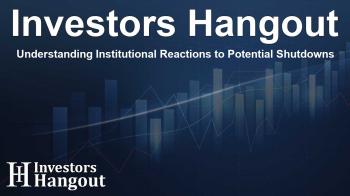Understanding Institutional Reactions to Potential Shutdowns

Understanding the Implications of a Possible Government Shutdown
The U.S. federal government is facing the possibility of a shutdown once again, with funding set to run out soon. Economists estimate that each week of disruption could cost the economy around $7 billion, affecting various markets. Federal employees may experience delayed pay, which could further impact consumer sentiment in a labor market already showing signs of slowing down.
Sector Rotation Towards Safety
Historically, government shutdowns lead investors to shift their focus towards more defensive sectors. Recent institutional flows indicate a growing interest in sectors such as utilities, consumer staples, and healthcare. These areas are typically viewed as safer bets during periods of uncertainty, particularly when cyclical sectors might experience significant funding challenges.
Top Defensive Sectors to Consider
Utilities
Utilities stocks, such as Duke Energy (DUK), NextEra Energy (NEE), and Southern Company (SO), tend to attract investors looking for stability. Their regulated cash flows and reliable dividend payments make them appealing during uncertain times, especially amid fluctuating bond yields.
Consumer Staples
When it comes to safety in consumer essentials, companies like Procter & Gamble (PG), Coca-Cola (KO), PepsiCo (PEP), and Walmart (WMT) are solid picks. The demand for everyday items remains strong, even during market downturns, making these stocks a favored choice among institutions striving for stability.
Healthcare
In the healthcare sector, firms such as UnitedHealth Group (UNH), Johnson & Johnson (JNJ), Merck (MRK), and Pfizer (PFE) show resilience during shutdowns. The funding for Medicare and Medicaid tends to remain intact during such events, which ultimately supports the revenue streams for insurers and large pharmaceutical companies.
Market Reactions and Sector Performance
Recent market activities illustrate this shift. On a notable Friday, healthcare stocks climbed by nearly 2%, consumer staples saw a modest increase, and utilities also gained ground, while more volatile sectors struggled to keep up. Rapid changes highlight how shutdown risks can shape overall market dynamics.
Defensive Allocations During Uncertainty
As investors navigate potential market disruptions, it is crucial to remain cautious. The anticipated shutdown amplifies existing late-cycle characteristics, with a clear preference for sectors that offer stability and predictability. While it may not alter long-term strategies for retail investors, it frequently introduces short-term volatility.
Strategies for Navigating Volatility
- Make defensive positions a priority, focusing on sectors like utilities, consumer staples, and healthcare that thrive in uncertain environments.
- Avoid aggressively pursuing high-risk sectors until there is clarity regarding funding and government operations.
- Prepare for potential delays in economic data releases which could shift market perceptions and lead to repricing of assets.
The Bottom Line
Investors should exercise patience and be mindful of the narratives surrounding potential shutdowns. These events can create a ripple effect throughout the markets, but they rarely derail economic fundamentals in the long run. By strategically adding to defensive positions, investors may weather the storm effectively as the situation develops.
Frequently Asked Questions
What should investors focus on during a government shutdown?
Investors should consider focusing on defensive sectors like utilities, consumer staples, and healthcare that can provide stability amidst uncertainty.
How do government shutdowns impact the economy?
Government shutdowns can cost billions, disrupt federal employee pay, and prompt consumers to become more cautious, potentially impacting consumer confidence and spending.
Which sectors typically perform well during shutdowns?
Sectors such as utilities, consumer staples, and healthcare often see increased investment during shutdowns due to their stability and essential nature.
Are high-beta stocks a good investment during uncertainty?
Generally, investors should be cautious with high-beta stocks during periods of uncertainty, as they tend to be more volatile and sensitive to market fluctuations.
How can investors prepare for volatility surrounding a shutdown?
Investors can prepare by diversifying their portfolios with defensive stocks and staying informed about potential changes in the market and economic data releases.
About The Author
Contact Dominic Sanders privately here. Or send an email with ATTN: Dominic Sanders as the subject to contact@investorshangout.com.
About Investors Hangout
Investors Hangout is a leading online stock forum for financial discussion and learning, offering a wide range of free tools and resources. It draws in traders of all levels, who exchange market knowledge, investigate trading tactics, and keep an eye on industry developments in real time. Featuring financial articles, stock message boards, quotes, charts, company profiles, and live news updates. Through cooperative learning and a wealth of informational resources, it helps users from novices creating their first portfolios to experts honing their techniques. Join Investors Hangout today: https://investorshangout.com/
The content of this article is based on factual, publicly available information and does not represent legal, financial, or investment advice. Investors Hangout does not offer financial advice, and the author is not a licensed financial advisor. Consult a qualified advisor before making any financial or investment decisions based on this article. This article should not be considered advice to purchase, sell, or hold any securities or other investments. If any of the material provided here is inaccurate, please contact us for corrections.

